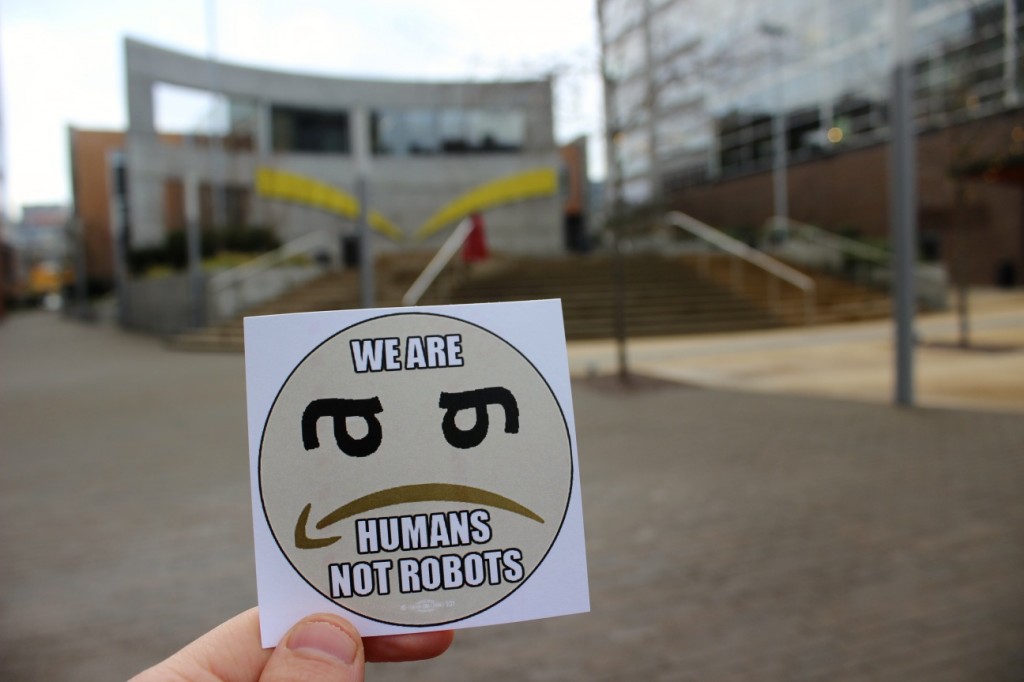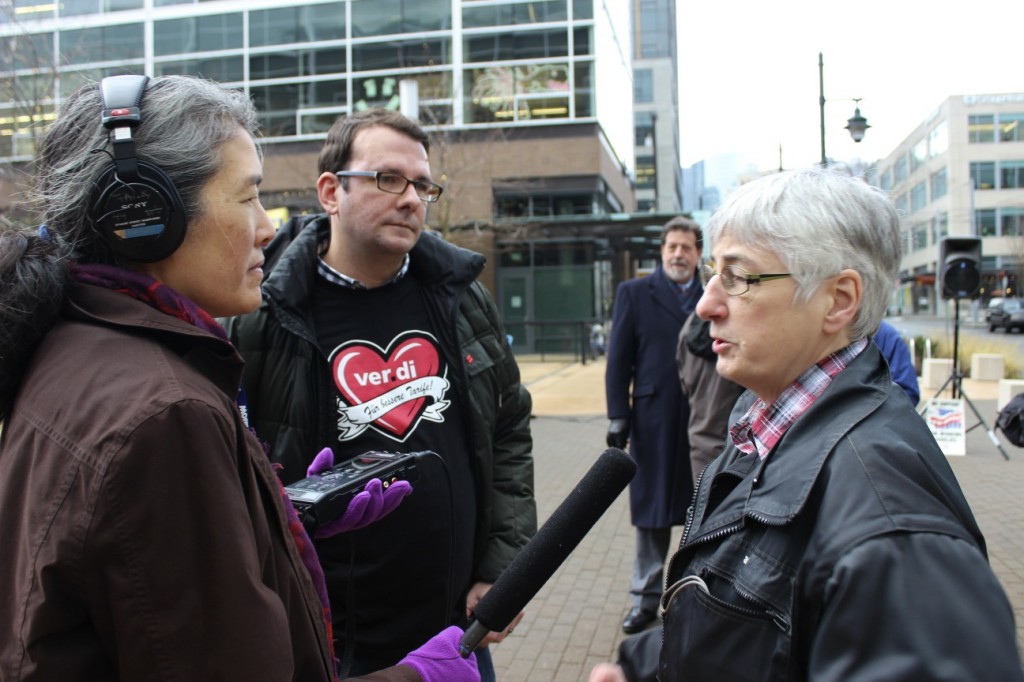
“We are people!”
“Not robots!”
That was the message Monday morning at the heart of Amazon.com’s Seattle headquarters, as about 50 people gathered to protest what they call unfair working conditions and wage inequality inside Amazon’s fulfillment centers in Germany.
 Nancy Becker, a warehouse worker from Bad Hersfeld, Germany, made the trip to Seattle to help organize Monday’s protest. She’s worked inside Amazon warehouses since November 2001 and is frustrated with what she calls unfair treatment in her workplace.
Nancy Becker, a warehouse worker from Bad Hersfeld, Germany, made the trip to Seattle to help organize Monday’s protest. She’s worked inside Amazon warehouses since November 2001 and is frustrated with what she calls unfair treatment in her workplace.
“I’m looking to support the American workers, and ask that the American workers support the European workers,” she said.
This protest coincided with further wildcat strikes at Amazon facilities in Germany that took place on Monday, just as holiday sales ramp up. The actions are being organized by the German labor union Ver.di, of which Becker is a member.
Markus Hoffmann-Achenbach, another Ver.di member, also flew to Seattle in support of the protests.
“We are proud to be here in Seattle where we stand together with our colleagues, sisters and brothers from the U.S. unions,” he said. “We are very glad that now the movement of Amazon workers worldwide is getting to a higher level and we are very happy that we are now raising our voice together against Amazon.”
Representatives from American unions including the AFL-CIO, United Food and Commercial Workers, Teamsters and Communications Workers of America were also in attendance Monday in support of the German union. The unions contend, among other things, that workers in Amazon’s distribution centers should be treated as retail employees, not lower-wage logistics workers.
 “These folks want a globalized economy; we want a globalized labor movement,” said David Freiboth, executive secretary of the Martin Luther King County Labor Council. “We want a labor movement that ensures that everyone from bottom to the top has a share of the prosperity that companies like this create.”
“These folks want a globalized economy; we want a globalized labor movement,” said David Freiboth, executive secretary of the Martin Luther King County Labor Council. “We want a labor movement that ensures that everyone from bottom to the top has a share of the prosperity that companies like this create.”
The protest drew a couple curious looks from Amazon employees who walked by. Most in attendance were either labor union supporters or media.
This certainly isn’t the first time Amazon.com workers from Germany have voiced their opinion on this issue. Ver.di says that Amazon refuses to hold formal negotiations with its union, which wants to address the “company’s practice of constant monitoring of workers,” and “unreasonable metrics that workers find impossible to meet,” in addition to unfair pay.
Here’s Amazon’s statement on the matter:
The vast majority of our workers in Germany are not participating in these strike activities. We feel it is best to work directly with our employees, not through an intermediary. In Germany, there are established works councils, comprised of Associates elected by their peers, in eight of our fulfillment centers. We interact with the works councils regularly to create the best working environment possible for our Associates.
We do not track employees. Like most companies, we have performance expectations. Productivity targets are set objectively, based on previous performance levels achieved by our workforce.
We actually pay more in total compensation than the “logistics” tariff that governs warehouse workers in Germany. Median pay after one year in our logistics centers is 5 percent higher than the logistics tariff in the respective regions. After two years and the first vesting of their stock associates on average earn 12 percent more compared to the logistics tariff. This includes a bonus and stock grants which over the past five years have added an average of eight percent to base pay annually.
Here’s another statement from Frank Bsirske, chairman of Ver.di:
Based on the philosophy of Amazon, “work hard, have fun, make history” — one has to emphasize: it’s the employees of Amazon in Germany, who are now making history by taking to the streets for their demands. What is characterizing the corporate culture of Amazon will not be left into the hands of managers — the employees are now taking the initiative. These people are performing successful and reliable services day by day. With great justice, they call their employer for appreciativeness, respect and a clear commitment to the collective agreement of the retail and mail order business.
The act of solidarity of American unions for the strikes in Germany is a powerful sign that cooperation among workers is not bounded by national borders and continents. These protests are an encouraging response to the questionable methods of a global company like Amazon.
Click any thumbnail below to see a gallery of images from the protest.











